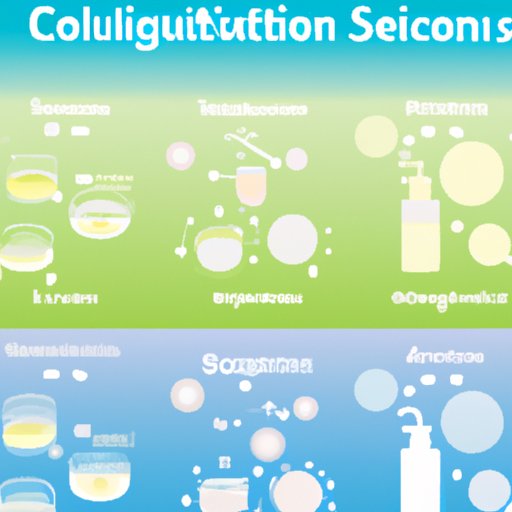Introduction
Lotions are an essential part of any skincare routine—but what exactly are they, and how do they work? A lotion is a type of moisturizer that helps to keep skin hydrated by helping to lock in moisture. It typically consists of a mixture of water, oil, and other ingredients that help to nourish the skin. In this article, we’ll explore the science behind lotion and how it works to keep skin healthy and hydrated.

Exploring the Science of How Moisturizers Work
Moisturizers help to keep skin hydrated by forming a protective barrier on the surface of the skin. This barrier helps to keep moisture locked in, preventing it from evaporating away. Moisturizers also contain ingredients that help to nourish the skin, such as vitamins, minerals, and antioxidants. These ingredients can help to reduce inflammation, protect against environmental damage, and promote skin healing.
What’s Inside Your Favorite Lotion?
The ingredients found in lotions vary depending on the type of product, but there are some common components. Water is usually the main ingredient, and it helps to hydrate the skin. Other common ingredients include oils (such as almond, coconut, or jojoba oil), emollients (such as shea butter or cocoa butter), and humectants (such as glycerin or hyaluronic acid). These ingredients help to keep skin hydrated, nourished, and protected.
The Benefits of Using Lotion
Using a good quality lotion can help to keep skin hydrated, soft, and healthy. Regularly applying lotion can help to reduce dryness, flakiness, and irritation. It can also help to reduce the appearance of fine lines and wrinkles, and protect against environmental damage. In addition, using lotion regularly can help to prevent skin conditions such as eczema and psoriasis.

Understanding the Different Types of Lotion
There are many different types of lotion available, including body lotions, facial lotions, and hand creams. Body lotions are designed to be used all over the body and typically have a thicker consistency. Facial lotions are lighter and more easily absorbed, and they often contain additional ingredients to help soothe and nourish the delicate skin on the face. Hand creams are specifically formulated for the hands and are usually thicker and more nourishing.
A Guide to Choosing the Right Lotion for You
When choosing a lotion, it is important to consider your skin type and needs. For example, if you have dry skin, you may want to look for a lotion with extra moisturizing ingredients such as shea butter or hyaluronic acid. If you have oily skin, you may want to look for a lotion that is lightweight and non-greasy. It is also important to consider the texture and consistency of the lotion—some lotions may feel too heavy or greasy, so it is important to choose one that feels comfortable on your skin.

The Pros and Cons of Natural vs. Synthetic Lotions
Natural lotions are made with plant-based ingredients and are typically free of synthetic chemicals and fragrances. They can be gentle on the skin and provide nourishing benefits. However, they tend to be more expensive than synthetic lotions, and they may not last as long. Synthetic lotions are often more affordable and can provide long-lasting hydration, but they may contain harsh chemicals that can irritate the skin.
Tips for Applying Lotion Properly
Properly applying lotion can help to maximize its effectiveness. Start by washing your hands and then patting your skin dry. Take a small amount of lotion and massage it into your skin in a circular motion until it is fully absorbed. It is important to avoid rubbing the lotion in too vigorously, as this can cause irritation. Finally, make sure to apply lotion to all areas of exposed skin, including your hands, feet, and face.
Conclusion
Lotion can be an effective way to keep skin hydrated and healthy. It is important to choose the right lotion for your skin type and to apply it properly. Understanding the science behind lotion and the various ingredients it contains can help you make an informed decision when selecting a moisturizer. Hopefully, this article has provided you with the information you need to make the best choice for your skin.
(Note: Is this article not meeting your expectations? Do you have knowledge or insights to share? Unlock new opportunities and expand your reach by joining our authors team. Click Registration to join us and share your expertise with our readers.)
